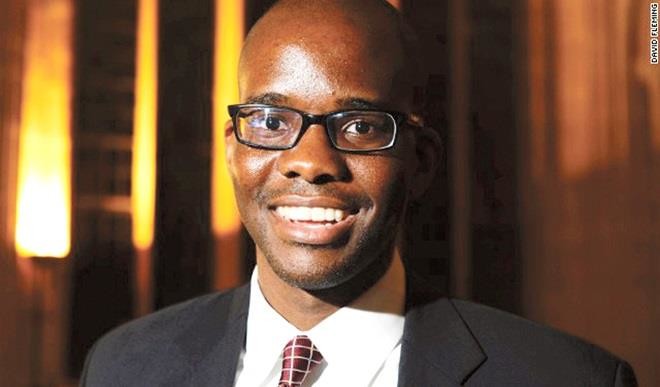Most fiction contain autobiographical elements – Tope Folarin
Bookshelf: You were recently shortlisted for the Caine Prize for African Writing. Now, you were winner of the same prize in 2013 for your short story, ‘Miracle’. Did this just come off or did you envisage this happening? Tope Folarin: When I was writing ‘Genesis’ I was just trying to write the best story I […]


Bookshelf: You were recently shortlisted for the Caine Prize for African Writing. Now, you were winner of the same prize in 2013 for your short story, ‘Miracle’. Did this just come off or did you envisage this happening?
Tope Folarin: When I was writing ‘Genesis’ I was just trying to write the best story I could. I hoped that people would respond to it. I am quite pleased that it is resonating.
Bookshelf: This story, just like ‘Miracle’, had a migration theme. What do you consider before or while writing?
Folarin: To me ‘Genesis’ is less about migration and more about a young man who is trying to piece his memories of a traumatic event into a comprehensible whole. Each time I write a story I’m trying to create the most compelling tale I can. That’s the only goal really. I will go with whatever works.
Bookshelf: What inspired the creation of ‘Genesis’?
Folarin: I wanted to write a story about a young man who is trying to reckon with his past, with his creation story. We all have creation stories – the question is how we respond to them. Do they guide us? Or are we resisting them? The young man in my story sometimes loses himself in memory, and sometimes he can’t recall certain events. Why? Has he simply forgotten certain things? Is he supressing certain memories? Memory is always shifting, is always selective. I’m curious about how memory becomes narrative.
Bookshelf: It was a rather touching piece, the kind that makes one ponder what was running through the writer’s mind. What do you hope to achieve through the narrative?
Folarin: I hope to influence people to think about their own creation stories, and how they have shaped them, and how they have been shaped by them.
Bookshelf: Did you contemplate the Caine Prize or any contest when you wrote it?
Folarin: No. No point in doing that. When I’m writing, the only thing I’m concerned with is making the story as great as it can be.
Bookshelf: A review of the story on Brittle Paper, an online literary magazine, by Kola Tubosun appeared to insist your story is an autobiography. What do you have to say about that?
Folarin: The story certainly has autobiographical elements. But it is a work of fiction. Many of my favourite fiction writers focus on autobiographical themes-James Joyce, Marcel Proust, Alice Munro, John Updike, Junot Diaz and Jamaica Kincaid among them. I’m writing in that tradition.
Bookshelf: Do you mind revealing aspects of the story that were taken directly from your childhood experience, if any?
Folarin: I would rather let the story speak for itself.
Bookshelf: By a story having strong elements of the writer’s experience, do you think that limits its authenticity as a creative work of fiction?
Folarin: I do not. Most fiction contains certain autobiographical elements. Many stories and novels are explicitly autobiographical. ‘The Olinger stories’ by Updike, for example, trace the life of a character who shares much in common with his creator. Same with the Nick Adams stories by Ernest Hemingway, Roberto Bolano’s stories, and Junot Diaz’s stories. Stephen Dedalus, the protagonist of ‘A Portrait of The Artist as a Young Man’, is a mirror image of James Joyce. ‘The View from Castle Rock’ and ‘Dear Life’ by Alice Munro both contains stories that have been carved from Munro’s life. One of my favourite stories, ‘Love and Honor and Pity and Pride and Compassion and Sacrifice’ by Nam Le, features a character named Nam Le who has abandoned his legal career to become a writer, just like the author. I could go on. I don’t think it’s possible to ‘limit’ the authenticity of fiction. Fiction is limitless, borderless. Fiction is anything you want it to be.
Bookshelf: How did you start writing?
Folarin: I started writing in graduate school. I had always wanted to write, but I did not give myself permission to do so until I achieved most of my academic goals. Once I reached graduate school, I could no longer contain myself.
Bookshelf: What time of the day are you at your peak while writing?
Folarin: Definitely at night, anytime past midnight.
Bookshelf: If you have room for only three books on your shelf, what will they be?
Folarin: Oh, I’m much too greedy for books. I cannot answer this question.
Bookshelf: Do you see yourself winning this year’s Caine Prize for African Writing?
Folarin: There are four other great stories on the shortlist. I feel privileged to be included.
Bookshelf: What do you do when you are not writing?
Folarin: I read a great deal. I also watch a lot of movies and spend much of my time at the local art museums.
Bookshelf: What are you working on at the moment?
Folarin: A few things – A novel, a short story, an essay.
Bookshelf: Can you give a sneak preview of your upcoming novel?
Folarin: I have. ‘Genesis’ is the first chapter.
